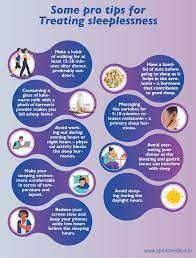Insomnia Solutions: Effective Strategies to Improve Your Sleep
Insomnia is a common sleep disorder that affects millions of people worldwide. It can have a significant impact on your daily life, leading to fatigue, irritability, and difficulty concentrating. If you’re struggling with insomnia, it’s essential to explore effective solutions to improve your sleep quality and overall well-being.
Establish a Consistent Sleep Schedule
One of the most crucial steps in combating insomnia is establishing a consistent sleep schedule. Try to go to bed and wake up at the same time every day, even on weekends. This helps regulate your body’s internal clock and can improve the quality of your sleep over time.
Create a Relaxing Bedtime Routine
A relaxing bedtime routine can signal to your body that it’s time to wind down and prepare for sleep. Consider activities such as reading a book, taking a warm bath, or practicing deep breathing exercises before bed. Avoid stimulating activities like watching TV or using electronic devices, as they can interfere with your ability to fall asleep.
Optimize Your Sleep Environment
Your sleep environment plays a significant role in the quality of your rest. Make sure your bedroom is conducive to sleep by keeping it dark, quiet, and cool. Invest in a comfortable mattress and pillows that support proper alignment and help you relax into restful slumber.
Maintain a Healthy Lifestyle
A healthy lifestyle can promote better sleep quality and overall well-being. Incorporate regular exercise into your routine, but avoid vigorous activity close to bedtime. Limit caffeine and alcohol consumption, especially in the hours leading up to bedtime. Eat a light snack if you’re hungry before bed, but avoid heavy meals that can disrupt digestion.
Consider Professional Help
If you’ve tried various strategies to improve your sleep with no success, consider seeking help from a healthcare provider or sleep specialist. They can evaluate your symptoms, identify underlying causes of insomnia, and recommend treatment options such as cognitive-behavioral therapy for insomnia (CBT-I) or medication if necessary.
By implementing these insomnia solutions and making positive changes in your daily habits, you can take proactive steps toward achieving better sleep and improving your overall quality of life.
6 Effective Strategies to Overcome Insomnia and Improve Your Sleep
- Establish a regular sleep schedule by going to bed and waking up at the same time every day.
- Create a relaxing bedtime routine to signal your body that it’s time to wind down.
- Avoid stimulants like caffeine and nicotine close to bedtime.
- Make sure your bedroom is conducive to sleep by keeping it dark, quiet, and at a comfortable temperature.
- Limit screen time before bed as the blue light can interfere with your sleep cycle.
- Consider relaxation techniques such as deep breathing or meditation to help calm your mind before sleep.
Establish a regular sleep schedule by going to bed and waking up at the same time every day.
Establishing a regular sleep schedule by going to bed and waking up at the same time every day is a fundamental tip for improving sleep quality and combating insomnia. By maintaining consistency in your sleep routine, you can regulate your body’s internal clock and promote a more restful night’s sleep. This practice helps synchronize your natural circadian rhythms, making it easier to fall asleep and wake up feeling refreshed and energized. Over time, adhering to a consistent sleep schedule can lead to better overall sleep patterns and improved well-being.
Create a relaxing bedtime routine to signal your body that it’s time to wind down.
Creating a relaxing bedtime routine is a crucial step in improving your sleep quality. By engaging in calming activities such as reading a book, taking a warm bath, or practicing mindfulness exercises before bed, you signal to your body that it’s time to wind down and prepare for rest. This routine can help reduce stress and anxiety levels, making it easier for you to transition into a peaceful and restful sleep. Consistency is key, so establishing a relaxing bedtime ritual can become a powerful cue for your body to relax and unwind at the end of each day.
Avoid stimulants like caffeine and nicotine close to bedtime.
Avoiding stimulants like caffeine and nicotine close to bedtime is essential for improving sleep quality and combating insomnia. Caffeine, commonly found in coffee, tea, and certain sodas, can disrupt your body’s natural sleep-wake cycle by blocking the effects of adenosine, a neurotransmitter that promotes sleep. Similarly, nicotine, often present in cigarettes and other tobacco products, is a stimulant that can increase alertness and make it harder to fall asleep. By steering clear of these stimulants in the hours leading up to bedtime, you can create a more conducive environment for restful sleep and promote better overall sleep health.
Make sure your bedroom is conducive to sleep by keeping it dark, quiet, and at a comfortable temperature.
Creating a sleep-conducive environment in your bedroom is essential for combating insomnia. Ensure that the room is dark, quiet, and maintained at a comfortable temperature to promote optimal rest. Darkness signals to your body that it’s time to sleep, while minimizing noise disturbances can help you stay asleep throughout the night. Additionally, a cool and comfortable temperature can enhance your ability to relax and drift off into a restful slumber. By prioritizing these environmental factors, you can set the stage for a peaceful and rejuvenating night’s sleep.
Limit screen time before bed as the blue light can interfere with your sleep cycle.
Limiting screen time before bed is a crucial tip in combating insomnia. The blue light emitted by electronic devices can disrupt your body’s natural sleep cycle by suppressing the production of melatonin, the hormone that regulates sleep. By reducing exposure to screens such as smartphones, tablets, and computers before bedtime, you can help signal to your body that it’s time to wind down and prepare for restful sleep. This simple adjustment can make a significant difference in improving your sleep quality and overall well-being.
Consider relaxation techniques such as deep breathing or meditation to help calm your mind before sleep.
Consider incorporating relaxation techniques such as deep breathing or meditation into your bedtime routine to help calm your mind before sleep. These practices can be powerful tools in reducing stress and anxiety, allowing you to unwind and prepare your body for restful sleep. By focusing on your breath or engaging in mindfulness meditation, you can quiet racing thoughts and promote a sense of calm that paves the way for a peaceful night’s sleep. Give yourself the gift of relaxation before bedtime to improve your chances of falling asleep easily and enjoying a rejuvenating night of rest.



